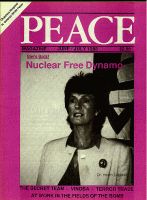
Peace Magazine Jun-Jul 1988, page 23. Some rights reserved.
Search for other articles by John Bacher here
Catherine Fitzpatrick and Janet Fleischman, From Below: Independent Peace and Environmental Movements in Eastern Europe and the USSR. A Helsinki Watch Report, October, 1987
This book is a healthy antidote to the Cold War virus spread by the ideologists of the two blocs. From Below comprehensively reviews the campaigns of our counterparts in the peace movement in the Eastern bloc that are usually ignored by the Western establishment and treated as subversive by the world's ruling Communist parties.
Even well-informed peace activists will be shocked by many of the book's revelations. If more widely publicized, it would widen support for the peace movement. For example, few know how deeply revered John Lennon is by our Eastern counterparts, whose values are remarkably similar to our own. Every December in Prague, on the anniversary of Lennon's death, hundreds of young people congregate at the "Lennon Wall," chanting slogans and writing poems on the wall.
Fitzpatrick and Fleischman point out that there are over 1,000 "Lennonists" in Czechoslovakia, who focus on ecological concerns, music, and peace issues. A similar group in the USSR stages a peace demonstration on the Lenin Hills on every December 8, (the anniversary of Lennon's death), singing Lennon's songs and carrying peace posters. These demonstrations have always been broken up by militia; dozens of young people are rounded up and often interned. One such youth leader, little known in the West, Yuri Popov, was charged with distributing leaflets calling for an end to the death penalty and to the war in Afghanistan. Arrested in 1983, he is still in a psychiatric hospital.
Western cold warriors are shocked to learn that such reactionary dissidents as Alexander Solzhenitsyn oppose the same brutalizing war machine economy that Western peace activists scorn. Solzhenitsyn, for example, opposes nuclear power.
Another treasure in From Below is a description of the growing Polish Freedom and Peace organization, the only opposition group in Poland struggling against the nuclear threat. It has campaigned vigorously since 1985 to secure the right of conscientious objection and a rejection of the compulsory military oath of allegiance to the USSR. Freedom and Peace members have conducted campaigns against Polish anti-Semitism, translated Amnesty International newsletters, documented the extent of environmental devastation in Poland, and successfully obtained the closure of a polluting steel mill. A good account is also given of the historic May 7-9, 1987 open seminar on "International Peace and the Helsinki Agreement" organized by Freedom Peace, which brought Western and independent Eastern peace activists together for the first time in conference in a Warsaw Treaty country.
The most amazing revelation in From Below is the rapid growth in citizen initiative in the USSR, combined with the fierce resistance to it by segments of the bureaucracy fearing democratic change. A May 10, 1987, incident in which peace activists were arrested and beaten was exposed by the newspaper of the official youth organization, the Komsomol, which complained that the law should provide "equal protection for those with all sorts of haircuts." Peace activists Nikolai Khramov and Aleksandr Rubehenko were beaten severely on May 9, 1986.
They were able to successfully lay charges against their assailants, some of whom were KGB agents. Despite attempts at intimidation, Khramov refused to drop his charges. Three attackers consequently received stiff sentences in the subsequent August, 1986 trial. This was an unprecedented victory for civil liberties in the Soviet Union.

Peace Magazine Jun-Jul 1988, page 23. Some rights reserved.
Search for other articles by John Bacher here